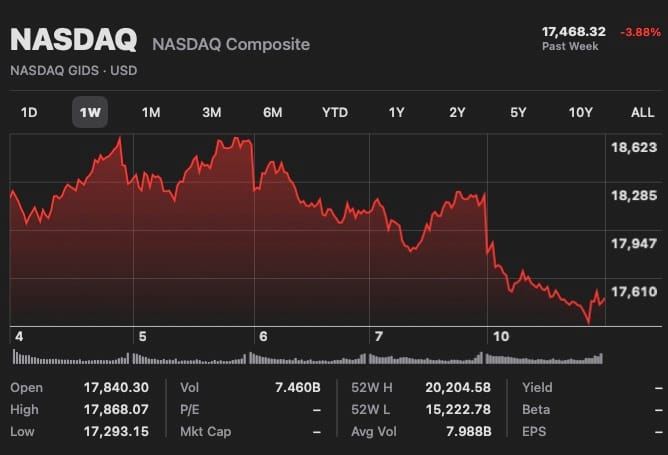March 11 2025
Wall Street drops; GOP funding vote; ICE targets student; Generic Ozempic ; U.S.-Ukraine-Russia talks

Wall Street Plunges Monday As Recession Fears Grow
House GOP Pushes Stopgap Funding as Trump Faces Trade War Fallout
ICE Arrest of Columbia Student Marks New, Darker Era of Campus Politics as Universities End Activist Stances
Generic Ozempic Approaches as Weight Loss Drug Patents Near End
U.S. May Resume Ukraine Aid as Talks Kick Off in Saudi Arabia, Ukraine Launches Massive Drone Attack
GET THE CITIZEN JOURNAL APP - FREE!
1. Wall Street Plunges Monday As Recession Fears Grow
Wall Street suffered its steepest decline of the year on Monday, a drop fueled by angst about the economy a day after President Trump refused to rule out the possibility that his policies could trigger a recession. The S&P 500 slid 2.7 percent, the worst daily fall in an already three-week-long stretch of selling. The index is now roughly 9 percent below a record set last month, and approaching a “correction,” a Wall Street term for a decline of 10 percent or more from a recent high. “The market volatility is much less about the bad news of tariffs and much more about the uncertainty of tariffs, especially uncertainty as to what the policy is, where it is headed, how long it will last and what the end result will be,” said David Bahnsen, the chief investment officer at the Bahnsen Group. In a Fox News interview that aired on Sunday, Mr. Trump was asked about “rising worries about a slowdown,” by the host, Maria Bartiromo. He described what might follow as “a period of transition,” and didn’t rule out the possibility that his policies would cause a recession. Asked during the interview when businesses might have clarity on the on-again, off-again tariff policies, Mr. Trump responded by suggesting that more tariffs could come. “We may go up with some tariffs. It depends. We may go up. I don’t think we’ll go down, or we may go up,” he said. “They have plenty of clarity.” The S&P 500 has now erased all the gains it made since Election Day. The Nasdaq has been hit even harder, as a rally in big tech stocks driven by enthusiasm for artificial intelligence reversed course. The index fell into a correction last week, and dropped a further 4 percent on Monday.

Editors note: markets are going to market, I.e. fluctuate. It’s too soon to make a diagnosis on the economy. Based on data from Wall Street and Main Street, it’s clear we’ve entered a new, unknown landscape post-COVID vs the 2010s. Be wary of anyone that tells you they fully understand this economy and can forecast the future.
Source: NYT
2. House GOP Pushes Stopgap Funding as Trump Faces Trade War Fallout
The Republican-led House plans to vote Tuesday on a stopgap measure to keep the federal government funded beyond Friday. President Donald Trump has been intensely lobbying members of his party to pass the measure, which seeks to avert a politically perilous shutdown early on his watch. Senate action would still be needed later this week to keep the government open. Trump, meanwhile, plans to speak to a group of business leaders Tuesday amid his administration’s escalating trade war, which has deepened a sell-off on Wall Street and renewed fears about the stability of the U.S. economy. Members of the Business Roundtable will be seeking reassurances from Trump about the path forward.
Source: WP
3. ICE Arrest of Columbia Student Marks New, Darker Era of Campus Politics as Universities End Activist Stances
A. President Donald Trump warned Monday that the arrest and possible deportation of a Palestinian activist who helped lead protests at Columbia University will be the first “of many to come” as his administration cracks down on campus demonstrations against Israel and the war in Gaza. Mahmoud Khalil, a lawful U.S. resident who was a graduate student at Columbia until December, was detained Saturday by federal immigration agents in New York and flown to an immigration jail in Louisiana. “We know there are more students at Columbia and other Universities across the Country who have engaged in pro-terrorist, anti-Semitic, anti-American activity,” Trump wrote in a social media post. “We will find, apprehend, and deport these terrorist sympathizers from our country — never to return again.” But a federal judge in New York City ordered Monday that Khalil not be deported while the court considered a legal challenge brought by his lawyers. A hearing is scheduled for Wednesday.
Source: AP
B. Just a few years ago, university statements on the day’s social and political issues abounded. When Russia attacked Ukraine in 2022, Harvard’s president at the time called it “senseless” and “deplorable,” and flew the invaded country’s flag in Harvard Yard. After George Floyd died under the knee of a white police officer, Cornell’s president said she was “sickened.” The University of Michigan’s president described the Oct. 7, 2023, violence against Israel as a “horrific attack by Hamas terrorists.” But over the last year, each of those universities has adopted policies that limit official statements on current issues. According to a new report released on Tuesday from the Heterodox Academy, a group that has been critical of progressive orthodoxy on college campuses, 148 colleges had adopted “institutional neutrality” policies by the end of 2024, a trend that underscores the scorching political scrutiny they are under. All but eight of those policies were adopted after the Hamas attack.
Source: NYT
4. Generic Ozempic Approaches as Weight Loss Drug Patents Near End
Drugmaker Hikma is in talks with partners across the world to prepare to sell a generic version of Ozempic and Wegovy, as patents on Novo Nordisk’s blockbuster diabetes and weight loss drugs start expiring as soon as next year. The FTSE 100 group is racing to produce a generic form of semaglutide, the active ingredient in the drugs. Patents on the branded versions are due to expire in Canada, China, India and Brazil in 2026, and in other markets between 2028 and 2032. Riad Mishlawi, Hikma’s chief executive, said the impact of the new class of drugs had a comparable impact to the first antibiotic penicillin. “It’s not only because of the weight loss . . . It is because the weight causes a lot of other diseases,” he said. “So when you treat this, indirectly, you’re treating a lot of diseases. So that’s why it has been a big craze and a lot of people are jumping on it.” Analysts have estimated the size of the weight loss drug market as anywhere between $80bn and $140bn. Mishlawi said the current medicines were “only the beginning” because there are so many new obesity drugs being developed. Some US health insurers and many European healthcare systems are restricting access to the drugs because of the cost implications given the number of obese and overweight patients. In the US, the list price for a month’s supply of Wegovy is more than $1,300. Generic drugs tend to be 80 to 85 per cent cheaper than branded medicines, according to the US Food and Drug Administration. When patents on weight loss drugs expire, generic versions are likely to be in very high demand.
Source: FT
5. U.S. May Resume Ukraine Aid as Talks Kick Off in Saudi Arabia, Ukraine Launches Massive Drone Attack
A. JEDDAH, Saudi Arabia—The Trump administration might restart intelligence sharing and military support to Kyiv if high-level talks between U.S. and Ukrainian officials on a potential peace process make headway on Tuesday, Secretary of State Marco Rubio said. “My hope is that we are going to have a really good meeting tomorrow and we will be in a different place very soon,” Rubio told reporters on his plane shortly before arriving in Saudi Arabia Monday night. The Tuesday meeting is the first top-level discussion between U.S. and Ukrainian officials since a combative Oval Office encounter in which President Trump accused Ukrainian President Volodymyr Zelensky of being unwilling to negotiate a peace settlement with Moscow.
Source: WSJ
B. Russian officials said Ukraine attacked Moscow before dawn on Tuesday with its largest long-range drone bombardment of the war, as both sides stepped up attacks ahead of talks intended to end three years of fighting. Moscow’s mayor, Sergei Sobyanin, said the attack was the largest against the city since the start of the war more than three years ago. At least two people were killed and 18 others were injured, the Russian authorities said, and the city’s four international airports, serving a metropolitan area of 21 million, were forced to temporarily suspend operations. The Russian Ministry of Defense claimed to have shot down at least 91 drones in the region around Moscow and more than 240 drones directed at other targets across the country. The Ukrainian military did not have any immediate comment on the strikes.
Source: NYT
March 11, 2011: Fukushima nuclear disaster
SUBSCRIBE ONLINE TO GET THE US CITIZEN JOURNAL IN YOUR INBOX - FREE!
See the Ad Astra Podcast! Released on Apple and Spotify around 10a CST.
Sponsors (click me!)










Sources
- https://www.nytimes.com/2025/03/10/business/stock-market-economy-tariffs-recession.html?smid=url-share (NYT)
- https://www.washingtonpost.com/politics/2025/03/11/trump-house-vote-government-shutdown/ (WP)
3A. https://apnews.com/article/columbia-university-mahmoud-khalil-ice-6964107d218dba43eb995d6dbbe528b1 (AP)
3B. https://www.nytimes.com/2025/03/11/us/institutional-neutrality-universities-free-speech.html (NYT) - https://www.ft.com/content/3f03b203-72a8-4921-9ecc-0c9ea9ec0f62 (FT)
5A. https://www.wsj.com/politics/national-security/marco-rubio-says-talks-in-saudi-arabia-key-to-resuming-military-support-for-ukraine-cb34b5a5?mod=hp_lead_pos2 (WSJ)
5B. https://www.nytimes.com/2025/03/11/world/europe/ukraine-russia-moscow-war-drones.html (NYT)
